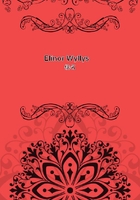
第152章
"Now tell me, brother Clarence, what think you Of this ----------------- ?"
Henry VI.
{William Shakespeare, "3 Henry VI", IV.i.1-2}
BEFORE the end of the week, the friends at Wyllys-Roof, after carefully examining all the facts within their knowledge, were confirmed in their first opinion, that the individual claiming to be William Stanley was an impostor. Mrs. Stanley was the last of the three to make up her mind decidedly, on the point; but at length, she also was convinced, that Mr. Clapp and this sailor had united in a conspiracy to obtain possession of her husband's estate. The chief reasons for believing this to be the case, consisted in the difference of CHARACTER and EXPRESSION between the claimant and William Stanley: the more Mr. Wyllys examined this point, the clearer it appeared to him, who had known his friend's only son from an infant, and had always felt much interested in him. As a child, and a boy, William Stanley had been of a morose temper, and of a sluggish, inactive mind--not positively stupid, but certainly far from clever; this claimant, on the contrary, had all the expression and manner of a shrewd, quick-witted man, who might be passionate, but who looked like a good-natured person, although his countenance was partially disfigured by traces of intemperance. These facts, added to the length of time which had elapsed since the reported death of the individual, the neglect to claim his inheritance, the suspicious circumstances under which this sailor now appeared, under the auspices of an obscure country lawyer, who bore an indifferent character, and to whom the peculiar circumstances of the Stanley estate were probably well known, all united in producing the belief in a conspiracy. There was no doubt, however, but that a strong case could be made out on the other hand by the claimant; it was evident that Mr. Reed was convinced of his identity; his resemblance to William Stanley, and to Mr. Stanley, the father, could not be denied; the similarity of the handwriting was also remarkable; his profession, his apparent age, his possession of the letters, his accurate knowledge of persons and places connected with the family, altogether amounted to an important body of evidence in his favour.
It would require a volume in itself, to give the details of this singular case; but the general reader will probably care for little more than an outline of the proceedings. It would indeed, demand a legal hand to do full justice to the subject; those who are disposed to inquire more particularly into the matter, having a natural partiality, or acquired taste for the intricate uncertainties of the law, will probably have it in their power ere long, to follow the case throughout, in print; it is understood at Longbridge, that Mr. James Bernard, son of Judge Bernard, is engaged in writing a regular report, which, it is supposed, will shortly be published. In the mean time, we shall be compelled to confine ourselves chiefly to a general statement of the most important proceedings, more particularly connected with our narrative.
"Here is a letter from Clapp, sir, proposing a compromise," said Hazlehurst, handing the paper to Mr. Wyllys. It was dated two days after the interview at Wyllys-Roof; the tone was amicable and respectful, though worded in Mr. Clapp's peculiar style. We have not space for the letter itself, but its purport was, an offer on the part of Mr. Stanley to forgive all arrears, and overlook the past, provided his father's estate, in its actual condition, was immediately placed in his hands. He was urged to take this step, he said, by respect for his opponents, and the conviction that they had acted conscientiously, while he himself by his own neglect to appear earlier, had naturally given rise to suspicion. He was therefore ready to receive the property as it stood at present, engaging that neither executors nor legatee should be molested for arrears; the sums advanced to Hazlehurst, he was willing should be considered equivalent to the legacy bequeathed to him by Mr. Stanley, the father, in case of his son's return, although in fact they amounted to a much larger sum.
This offer of a compromise merely confirmed the suspicions of all parties at Wyllys-Roof. The offer was rejected in the same letter which announced to Mr. Reed, that the defendants had seen as yet no good reason for believing in the identity of the individual claiming the name of William Stanley, and consequently, that they should contest his claim to the Stanley estate.
After this step, it became necessary to make every preparation for a trial; as it was already evident, from the usual legal notices of the plaintiffs, that they intended to carry the case into a court of justice, with as little delay as possible. It was the first object of Mr. Wyllys and Hazlehurst, to obtain as much testimony as lay within their reach, upon the points of the capacity and natural temperament of William Stanley; letters were written, in the hope of discovering something through the old family physician, the school-master, and companions of the young man before he went to sea; and Mrs. Stanley even believed that the nurse of her step-son was still living. Agents were also employed, to search out some clue, which might help to trace the past life and character of the individual bearing the name of William Stanley. Harry was only awaiting the expected arrival of Mr. Ellsworth, before he set out himself for the little town in the neighbourhood of Greatwood, where he hoped to gather much useful evidence. To what degree he was also desirous of the pleasure of meeting Mrs. Creighton again, we cannot say; but his friends at Wyllys-Roof believed that he was quite as anxious to see the sister as the brother. He had not long to wait, for, punctual to the appointed day, the earliest possible, Mr. Ellsworth arrived, accompanied by Mrs. Creighton.